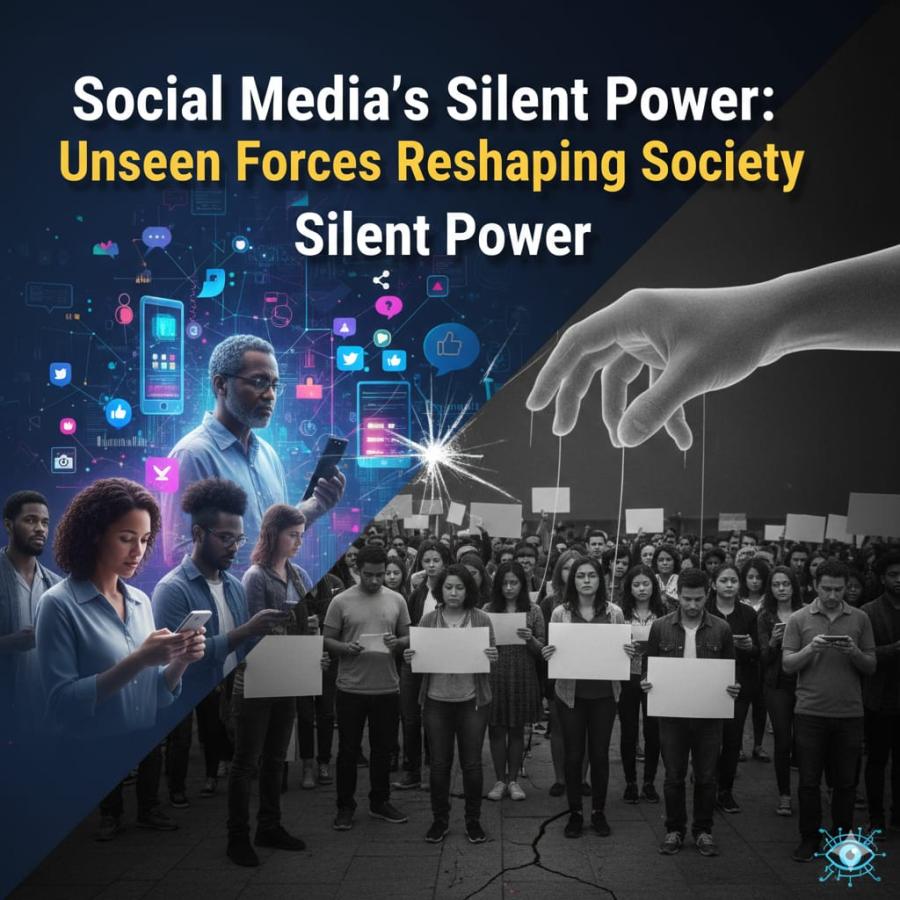
The Facebook-Cambridge Analytica scandal was a stark reminder of the unseen power that social media platforms hold over our lives. But beyond the headlines, the deeper question remains: how much influence should these tech giants have over what we think, feel, and do? From shaping political outcomes to determining our self-worth, social media is reshaping society in ways that are often hidden from view. Yet, the platforms that govern this new digital landscape remain largely unaccountable, leading to a pressing need for regulation and a rethinking of the role these companies play in our lives.
The Algorithmic Grip on Society
At its core, social media is built around one thing: engagement. Every scroll, like, and share feeds into an algorithm designed to capture our attention and keep us hooked. What begins as a casual post or a quick update soon becomes a cycle of endless content, curated to trigger emotional reactions and keep us coming back for more. This system, while profitable, is not neutral; it is designed to amplify extremes, prioritize sensationalism, and favor content that elicits strong emotions over truth. In the race for clicks and views, accuracy becomes secondary.
Take, for example, the role social media played in the spread of misinformation during the 2016 U.S. Presidential Election. False news stories, fueled by bot accounts and clickbait headlines, spread faster than fact-checked reports, influencing public opinion in ways that are still being debated today. Social media platforms, despite their immense power, were slow to act, offering only half-hearted responses to the manipulation of their systems. This oversight created an environment where misinformation became a tool for political warfare, with real-world consequences that reverberated far beyond the digital sphere.
The Misinformation Epidemic
Misinformation is no longer a side effect of social media—it is baked into the system. Studies show that false information spreads six times faster than true information on Twitter, and the 2016 election was just one high-profile example. Whether it’s misleading health advice, fake news, or conspiracy theories, social media platforms have become the breeding grounds for content that is either misleading or outright harmful.
The problem lies not just in the misinformation itself but in the very design of these platforms. By prioritizing engagement over accuracy, social media algorithms promote content that generates the most reactions, regardless of its truthfulness. This feeds into echo chambers, where users are constantly exposed to content that reinforces their existing beliefs, creating a dangerous feedback loop that deepens political divisions and fuels social unrest.
The Mental Health Toll
The influence of social media extends beyond the political sphere and into our personal lives. Platforms like Instagram, Snapchat, and TikTok have revolutionized how we present ourselves to the world. But the pressure to conform to an idealized, often unattainable image of beauty, success, and happiness is taking a significant toll on mental health. Studies have shown a strong correlation between heavy social media use and increased rates of anxiety, depression, and body dysmorphia, especially among younger users.
The curated, polished images we see on social media are rarely reflective of reality. Instead, they present a distorted view of life, one that is filtered and edited to perfection. Constant exposure to these images creates a sense of inadequacy and comparison, leading many to question their self-worth. Worse, the addictive nature of social media—the constant barrage of likes, notifications, and comments—exacerbates this problem, making it harder to break free from the cycle.
Political Polarization and Divisiveness
Perhaps one of the most troubling effects of social media is its role in deepening political polarization. As social media platforms increasingly become our primary source of news, they also serve as the primary battleground for ideological wars. Content that sparks outrage or confirms biases is amplified, creating an environment where the middle ground disappears. Instead of engaging in thoughtful, informed discussions, users are often pulled into hostile, binary debates.
This divisiveness is not merely a byproduct of user behavior but a direct consequence of platform design. The algorithms that drive social media prioritize content that generates strong emotional reactions, and extreme viewpoints often deliver the greatest returns. As a result, users are more likely to encounter content that aligns with their beliefs while being shielded from alternative perspectives. This fragmentation of the public discourse weakens the democratic process, undermines the pursuit of truth, and fosters a climate of distrust.
The Case for Accountability
The absence of accountability for social media platforms is one of the most critical issues of our time. These companies, with their vast influence over public opinion, political outcomes, and personal lives, operate with minimal oversight. While they claim to be neutral platforms for free expression, their algorithms, designed for profit, prioritize engagement over truth and user well-being.
There is a growing consensus among experts, policymakers, and the public that social media platforms must be held accountable for the impact they have on society. This means regulating how content is distributed, requiring transparency in algorithms, and imposing penalties for the spread of harmful or misleading content. Social media companies should be required to implement stronger safeguards to protect users from harmful effects, such as mental health issues, online harassment, and the spread of misinformation.
Immediate Action Required
As we move forward, we must take a hard look at the role social media plays in our lives. These platforms hold immense power—power that is currently unchecked. It’s time to demand change. We need greater transparency, stronger regulation, and a commitment to user well-being over profit. Social media can be a force for good, but only if it is held accountable for the consequences it produces.
It is also up to us, as users, to be more responsible in how we engage with these platforms. We must be critical consumers of the content we encounter and share. By questioning what we see and holding ourselves accountable for the information we spread, we can help mitigate the harmful effects of social media.
In the end, the power of social media is not inherent; it is a reflection of how we choose to use it. The question is: Will we let it control us, or will we reclaim that power?
By Gautam Jha
Managing Editor





















